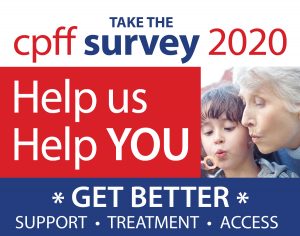A Message from the Executive Director

Dear Pulmonary Fibrosis Community,
I want to start by offering my sincere thanks and appreciation to all of you for supporting one another during the current COVID-19 crisis. I also want to convey our gratitude to the health care professionals within our ILD community, who continue to work on the front lines of this pandemic. Their work is so critical for the health and safety of us all.
These are challenging and unusual times, and recent weeks have been hard on many of us emotionally as we all deal with the impact of COVID-19. There’s no part of our daily lives that have not been disrupted. At the same time we are seeing a significant increase in demand for essential services (groceries, banking, medications and medical appointments).
Since the pandemic was declared on March 11, 2020, the Canadian Pulmonary Fibrosis Foundation (CPFF) has seen a massive increase in online information, videos and seminars/webinars on COVID-19. In the next article, we’ve added a list of reliable online resources on COVID-19. We recommend you turn to these sources first for guidance.
One bright light I’ve seen is the generosity of Canadians who have stepped up to help. I’m grateful to live in a country like Canada that responds generously in times of crisis. I’m grateful that I have a team of incredibly dedicated people (all volunteers) who don’t think twice about sacrificing their evenings and weekends during a crisis to ensure our Pulmonary Fibrosis (PF) members are connected and informed. And I’m grateful for the trust of the PF community in CPFF to be there for them (i.e. Zoom for virtual support group meetings).
CPFF will continue to be here for you as you adapt to your new normal during COVID-19, which is becoming a more virtual world, and we will be with you in the future for whatever your new normal becomes. We’ll also be continuing to create and share valuable resources to support you through the coming months.
A crisis like this teaches us the value of community and of supporting each other, holding each other in our lives. I know that we will all emerge stronger and I hope that the impact on our lives here and around the world is short-lived.
Stay safe,

Sharon Lee, MA, CFRE
Executive Director

It can be scary and overwhelming living with PF in a world dealing with COVID-19. You cannot ignore the warnings and grim statistics at home and abroad. And they keep reminding you that you are one of the vulnerable. Everything is on hold and uncertainty reigns. But, you already know more than most about avoiding viruses and dealing with restrictions to your everyday life. You are strong and resilient and you are NOT alone.
The following are a few tips and resources to help you cope and to share with others.
- Get your information about COVID-19 from reliable sources. At the end of this article is a list of reliable websites and social media outlets from the federal and provincial governments as well as the World Health Organization (WHO).
- Limit the time you watch or read the news. It’s mostly about COVID-19 these days. Decide to watch a single newscast and/or read a single newspaper. Check your news feeds on your devices only twice a day.
- Get some exercise. If you cannot go outside safely, check out our PF exercise video here.
- Know that the provinces have extended anti-fibrotic medication prescriptions to cover this time. You won’t need to submit annual test results and paperwork until this crisis passes. Check in with your specialist or family doctor for confirmation.
- Share your knowledge about preventing infection. As a person with PF, and especially if you have had a transplant, you are an expert on protecting yourself from viruses with a compromised immune system. You already have the good hygiene habits you need to protect yourself.
- If you are feeling anxious or stressed, the CAMH website offers a variety of tips, coping strategies and resources to help you manage your mental health during these difficult times.
- Be grateful for some of the good things this situation has given us: Lots of calls, emails and social media messages offering support and assistance; cleaner air and water due to less human activity; a slower pace of life; and quality family time with those you live with and with extended family and friends – using technology.
- Get support from your PF Community. Some support groups are now meeting virtually. Some members probably have personal connections with one another they can contact directly. Share your thoughts and feelings – and inspiration – on the CPFF Facebook and Twitter.
The following are some trustworthy online resources for COVID-19 information and updates, as well as the corresponding social media sites.
World Health Organization https://www.who.int/
Federal Health Authority (Health Canada)
Health Canada – COVID-19 Main Website Page
https://www.canada.ca/en/public-health/services/diseases/coronavirus-disease-covid-19.html
Health Canada – COVID-19 Guidance for being prepared
Provincial/Territorial Health Authorities Official Resources
Alberta
Call – 811
Official website: https://www.alberta.ca/coronavirus-info-for-albertans.aspx
Official Alberta social media channels:
Instagram– @albertahealthservices, https://www.instagram.com/albertahealthservices/?hl=en
- Facebook- @albertahealthservices, https://www.facebook.com/albertahealthservices/
- Twitter – @GoAHealth, https://twitter.com/GoAHealth
British Columbia
Call – 811
Official website: http://www.bccdc.ca/health-info/diseases-conditions/covid-19
Official British Columbia social media channels:
- Facebook- @ImmunizeBC, https://www.facebook.com/ImmunizeBC/
- Twitter– @CDCofBC, https://twitter.com/CDCofBC
Manitoba
Call – 1-888-315-9257
Official website: https://www.gov.mb.ca/covid19/index.html
Official Manitoba social media channels:
- Facebook- @manitobagovernment, https://www.facebook.com/ManitobaGovernment/
- Twitter- @mbgov, https://twitter.com/mbgov?lang=en
New Brunswick
Call – 811
Official website: https://www2.gnb.ca/content/gnb/biling/coronavirus.html
Official New Brunswick social media channels:
- Facebook- @GovNB, https://www.facebook.com/GovNB/
- Twitter – @Gov_NB, https://twitter.com/Gov_NB
- Instagram – @gnbca, https://www.instagram.com/gnbca/?hl=en
Newfoundland and Labrador
Call – 811 or 1-888-709-2929
Official website: https://www.gov.nl.ca/covid-19/
Official Newfoundland and Labrador social media channels:
- Facebook – @GovNL, https://www.facebook.com/GovNL
- Twitter – @GovNL, https://twitter.com/GovNL
- Instagram- @govnlsocial, https://www.instagram.com/govnlsocial/
Northwest Territories
Call – 911
Official website: https://www.hss.gov.nt.ca/en/services/coronavirus-disease-covid-19
Official Northwest Territories social media channels:
- Facebook – @NTHSSA, https://www.facebook.com/NTHSSA
Nova Scotia
Call – 811
Official website: http://www.nshealth.ca/covid19-news
Official Nova Scotia social media channels:
- Facebook- @NovaScotiaHealthAuthority , https://www.facebook.com/NovaScotiaHealthAuthority
- Twitter – @healthns, https://twitter.com/healthns
- Instagram – @novascotiahealthauthority, https://www.instagram.com/novascotiahealthauthority/
Nunavut
Call – 1-867-975-5772
Official Nunavut website: https://www.gov.nu.ca/health/information/covid-19-novel-coronavirus
Official Nunavut social media channels:
- Facebook – @GovofNunavut, https://www.facebook.com/GovofNunavut/
- Twitter- @GovofNunavut, https://twitter.com/GovofNunavut
- Instagram – @governmentofnunavut, https://www.instagram.com/governmentofnunavut/
Ontario
Call – 1-866-797-0000
Official Ontario website: https://www.ontario.ca/page/2019-novel-coronavirus
Official Ontario social media channels:
- Facebook- @ONThealth, https://www.facebook.com/ONThealth/
- Twitter- @ONThealth, https://twitter.com/ONThealth
- Instagram – @ongov, https://www.instagram.com/ongov/?hl=en
Prince Edward Island
Call – 811
Official Prince Edward Island website: https://www.princeedwardisland.ca/en
Official Prince Edward Island social media channels:
- Facebook – @GovPe, https://www.facebook.com/govpe/
- Twitter- @InfoPEI, https://twitter.com/InfoPEI
Quebec
Call – 811
Official Quebec website: https://www.quebec.ca/en/health/health-issues/a-z/2019-coronavirus/
Official Quebec social media channels:
- Facebook – @GouvQc, https://www.facebook.com/GouvQc/
- Twitter- @sante_qc, https://twitter.com/sante_qc
Saskatchewan
Call – 811
Official Saskatchewan website: https://www.saskatchewan.ca/government/health-care-administration-and-provider-resources/treatment-procedures-and-guidelines/emerging-public-health-issues/2019-novel-coronavirus
Official Saskatchewan social media channels:
- Facebook- @SKGov, https://www.facebook.com/SKGov
- Twitter- @SKGov, https://twitter.com/SKGov
Yukon
Call – 811
Official Yukon website: https://yukon.ca/covid-19
Official Yukon social media channels:
- Facebook – @yukonhss, https://www.facebook.com/yukonhss
- Twitter – @hssyukon, https://twitter.com/hssyukon?lang=en
Join the fight to keep clinical trials and access to new medications in Canada

CPFF, as a member of the Canadian Organization for Rare Disorders (CORD), is advocating against proposed government regulation that will restrict the actual selling price of all new medicines to a single arbitrary standard, without regard for severity of condition, unmet need or the added benefits over existing therapy.
CPFF is asking you to visit www.fightforourlives.ca and complete the online form to send an email to your MP with copies to Prime Minister Justin Trudeau and Health Minister Patty Hadju, asking them to stop the changes that will jeopardize Canadians’ access to clinical trials and new, life-saving medications.
If these proposed regulations had been in place a decade ago, it is uncertain whether clinical trials of the anti-fibrotic drugs Pirfenidone (Esbriet®) or nintedanib (OFEV™) would have been conducted in Canada, or if the drugs would have been made available to Canadians. This would have been a grave loss to Canadians living with pulmonary fibrosis.
According to CORD, changes proposed by Canada’s Patented Medicine Prices Review Board (PMPRB) are the biggest barriers to new drugs coming to Canada, including breakthrough, lifesaving, life-altering, first-ever treatments for rare and common conditions.
What the PMPRB is proposing
In response to concerns about rising drug budgets, the Patented Medicine Prices Review Board has stepped away from its legally mandated role to review drug prices to ensure they are not excessive—to a self-designated role to set drug prices with a two-pronged process.
First, list price of drugs cannot be higher than the median price of 11 comparative countries. Not unreasonable and not likely to stop drugs from being brought to Canada.
Second, the PMPRB proposes to restrict the actual selling price of all new medicines to a single arbitrary standard, without regard for severity of condition, unmet need or the added benefits over existing therapy. For about 80 per cent of new medicines, this single arbitrary price, which was set with no evidence as to appropriateness, with no consultation as to impact on patients, and with no consensus among stakeholders as to feasibility, will be far below manufacturers’ cost of research, development and ongoing support.
The impact on you
Not surprisingly, manufacturers have indicated they will not bring new medicines to Canada – perhaps after pricing has stabilized in other countries, or perhaps never. Indeed, fearing the impact of the new drug price controls, manufacturers reduced clinical trials in Canada by about 40 per cent in 2019 and at beginning of 2020, have announced withholding the launch of a half-dozen important new drugs, with more to come.
This means new medications for pulmonary fibrosis, as well as many other conditions, may not be tested in Canada or be made available to Canadians, for sometime, if ever.
Rising drug budgets – good or bad news?
Thanks to new medicines, people are living longer with chronic conditions (cancer, heart disease, diabetes, hepatitis, HIV) that were once fatal; people with rare diseases have first-ever therapies, such as anti-fibrotic drugs for people with pulmonary fibrosis; and cell and gene therapies cure diseases, but have one-time, high upfront costs.
According to CORD, Canada’s drug budgets were designed for older 20th century medicines and have not been updated to address 21st century innovative therapies. The organization also says that considering drug funding in isolation, does not take into consideration the benefits of new drug therapies across the health care system, such as reduced costs for emergency care, disability or organ failure, to name a few. In addition, CORD says Canada has not implemented collaborative, innovative drug financing solutions.
What can you do?
CPFF encourages you to educate yourself about this issue. For more details, read the extensive CORD’s Response to Patented Medicine Prices Review Board (PMPRB). Then, visit www.fightforourlives.ca and complete the online form to send an email to your MP asking them to stop the changes that will jeopardize Canadians’ access to clinical trials and new, life-saving medications.
Editor’s note: This article was adapted and edited using information from www.fightforourlives.ca.
Help us help you. Please complete our survey

While we’re all housebound, now is the perfect time to take 10 to 15 minutes to complete the survey. As an added incentive and thank you, you can add your email address, if you wish to participate in a random draw of respondents for one of 50 $10 Tim Horton’s gift cards. Take the survey here: CPFF 2020 patient/caregiver survey.
“The survey results will help your Foundation to focus on the research, activities, resources and advocacy initiatives that you want,” says Sharon Lee, CPFF’s Executive Director. “Your unique experiences will help inform how we advocate for better support, treatments, and access to care that will make a difference for you.”
The survey will help CPFF better understand how living with, or caring for someone with, pulmonary fibrosis or interstitial lung disease is impacting your life and how we can best help you and your family.
The survey asks about your experience when you were first diagnosed, the aspects of lung disease that are having the greatest impact on you, and the accessibility of different types of support. It also probes the aspects of lung disease that you’d like to learn more about and the sources of information that are most helpful to you.
Your privacy is important to us. The data collected from the survey may be shared with government agencies and other disease organizations. To ensure your privacy and confidentiality, individual responses will not be identifiable. Please note that selected quotations may be used publicly without reference to a respondent’s name or any other identifying information.
Knowledge gives you power over your fear during transplant journey

Like too many others, Barbara Barr-Haylock’s convoluted route to a diagnosis of IPF took several years. After three lung infections in five years, and visits to a cardiologist, a gastroentologist and a local respirologist, who told her she had “sensitive lungs,” an x-ray in 2010 finally revealed she had Interstitial Lung Disease (ILD).
“I’d never even heard of ILD or IPF before I started this journey,” she says. “When my family doctor told me the x-ray results, I immediately checked out ILD online to find out everything I could. I found out that TGH had just opened its ILD clinic, so I asked for a referral there. I also learned that I was probably going to need a lung transplant at some point.”
A CT scan in 2011 at the ILD clinic in Toronto, confirmed Barbara had PF, but it wasn’t until after a lung biopsy in 2012 that her diagnosis of IPF was confirmed.
Her pursuit of information, her commitment to staying as healthy as possible, as well as helping others deal with PF, has characterized Barbara’s PF and lung transplant journeys.
In 2011, Barbara took early retirement at age 60. When she was diagnosed with IPF in 2012, the first anti-fibrotic medication pirfenidone (Esbriet®) had just been approved by Health Canada, but was not yet funded in Ontario. Just days after pirfenidone was funded in Ontario in 2014, Barbara was approved to take part in a clinical trial of a new anti-fibrotic nintedanib (OFEV™), which was underway in Hamilton at the Firestone Chest Clinic. She participated in the Hamilton trial for six months and continued the medication for another two years.
In 2013, following an acute exacerbation, Barbara also began oxygen therapy, eventually progressing to 16 litres, with three reservoirs of liquid oxygen along with seven LOX portables and living with two, 10 litre concentrators, “which sounded like a jet engine, they were so noisy,” she adds.
“Going out with oxygen, reminded me of going out with small children, there are so many things to consider. How long will I be out? Do I have everything I need? Can I manage it all? And how embarrassed will I feel with the nasal canula and my equipment? What if something happens? Some days I hated it. It can be exhausting and depressing.”
At this time, her respirologist talked to her about being assessed for a lung transplant. “I called it the shock and awe discussion,” says Barbara. The transplant assessment went well. Barbara was a good candidate, but not yet. “They basically put people on the list who are not expected to live for more than two years and will not only survive the surgery, but benefit from it. I guess I was fortunate I wasn’t bad enough yet.”
Between 2013 and 2016, Barbara worked hard to keep her status as a good transplant candidate. “I was running away from a transplant, but in a good way, to maximize my time on this side of the transplant. I did my best to manage my symptoms to stack things in my favour for a good transplant result.”
Barbara pushed herself on the treadmill, drove and did her shopping and cooked meals. She got involved in online PF groups and became a member of the CPFF Board of Directors and is currently the Board’s Vice- Chair. She was determined to stay informed and to help others with PF learn how they could take control of their health. “Getting involved in the PF community allows you to look beyond yourself. It’s not a pity-party. It’s about taking charge and being prepared for any eventuality,” she says.
There was plenty to consider in the three years until Barbara went on the transplant list. “My husband was getting older. We had no idea how sick I would get after the transplant. And there is no doubt a transplant puts a heavy burden and stress on the caregiver. Living with a chronic illness and undergoing a transplant are WE journeys, not ME journeys,” she insists.
In early 2016, Barbara was again assessed for a lung transplant and was put on the list in November. She was able to get a copy of the transplant patient manual and read through it in advance of her assessment meetings. “The session is like a university lecture, it’s a lot to take in at one time. If you can, it’s best to read the manual in advance, just like you would prepare for a lecture. Then, you can focus better and prepare your questions. It’s much more productive.”
When she finally underwent her transplant, she was “comfortably committed” to the process. “I was still afraid, but it was a good fear. It was fear with knowledge, that I found so much better.”
In June 2017, Barbara received the gift of a right lung. She doesn’t remember the first few days after the surgery. But, it wasn’t long before she was chaffing at the confinement of being in the hospital. She got up and walked in record time and for a record distance.
Along with the physical recovery, transplant patients need to undergo training on their new drug regimen and do it themselves, with supervision, for 48 hours before being released from hospital. Post-surgery, Barbara was taking 47 pills. She now takes about 20. Regardless of their age or whether they have private drug coverage, every transplant patient is required to apply for “exceptional” drug coverage from their province, to ensure they can comply with the drug regimen after the surgery and benefit from this gift.
Just 11 days after her transplant, Barbara went home on Canada Day, 2017. Two days later, she made dinner. With a single lung transplant she still has IPF, but she did not require oxygen therapy for two and a half years after her transplant and it is still at a much-reduced level from before her surgery.
“Pushing myself in the years before my surgery paid off. Of course not everyone is able to do this, with many sick enough that they require hospitalization in advance of their transplant.”
Barbara urges candidates to listen to others’ stories, but with the understanding that everyone’s journey is unique to them and their circumstances. Learn everything you can so you are prepared. “At TGH, there were lots of online resources, including a video, and of course the patient manual. Read as much as you can in advance,” she says. “And have your caregiver involved and educated too. They will do most of the heavy lifting.” In addition to her husband Malcolm, Barbara’s brother Doug lives in the same household and was able to help out too.
Asked whether she would undergo the transplant knowing what she does now, Barbara offers a strong, “yes.” Because of her transplant drug regimen, she cannot take anti-inflammatory medication, which would help with her chronic back pain. “I may be in pain now, but I’m here to enjoy it,” she quips. “You take the bad with the good, and it certainly beats the alternative.”
What would she tell others considering a transplant? “The preparation is stressful, there’s a lot to take in. Take advantage of all of the available resources to learn all you can and be prepared. Knowledge gives you power over your fear.”
As for the current restrictions of COVID-19: Barbara adds that “as a transplant patient, I’ve already dealt with something similar, leaving the hospital with no immune system. I’ve learned how to isolate and practice good hygiene habits to protect myself. Life can still be good.”
An additional note from Barbara:
As part of our desire to give forward, we fostered a future dog guide for the Lions Foundation of Canada Dog Guides. Mandy was with us from January 2019 to February 2020. Our beautiful yellow lab learned her basic training, but more important was her socialization. We call this seeing them through elementary and high school. She accompanied me almost 24/7, including to medical appointments, especially at TGH, and to many events promoting Dog Guides. Mandy is now back at Dog Guides University in their service program for those with a physical disability, one of their seven programs (see www.dogguides.com). People constantly asked if I thought it would be hard to give her up. I said yes (and it was), but that in June 2017 another family made a difficult decision and because of that decision I am here today with a better quality of life.
Are you getting all the benefits you can?

There’s a nifty little tool on the Government of Canada’s website called the Benefits Finder. It asks a series of “generic” questions like your age, where you live, if you have a chronic illness, etc. It is quite simple to use, offering several optional answers and boxes to tick off and it takes less than 10 minutes to complete the most customized version.
Once you submit your answers, it gives you a list of health programs, income programs and other programs that you may be eligible for from both the federal government and your provincial or territorial government.
Each benefit on your list has a link to more details about each program. We think it’s worth the time to see if there is a benefit program that may apply to your specific circumstances. And, the Benefits Finder does not collect or track your information, so limited privacy concerns here.
You may also want to check out CPFF’s list of other helpful links on our website.
Research grants deadline extended

The deadline for applications for CPFF’s two, $20,000 research grants for 2020-2021 has been extended until October 9, 2020, due to COVID-19.
In keeping with CPFF’s mission to raise funds to finance research to better understand, develop treatments and find a cure for pulmonary fibrosis, the Foundation offers the research grants each year to fund clinical research relevant to patient care and/or translational research. The research must be done in Canada and be relevant to Canadians and Canadian patients.


